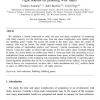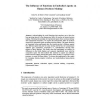303 search results - page 49 / 61 » Interfaces as Games, Programs as Strategies |
ICALP
1994
Springer
13 years 11 months ago
1994
Springer
We introduce a formal framework to study the time and space complexity of computing with faulty memory. For the fault-free case, time and space complexities were studied using the...
IVA
2010
Springer
13 years 6 months ago
2010
Springer
Acknowledging the social functions that emotions serve, there has been growing interest in the interpersonal effect of emotion in human decision making. Following the paradigm of e...
UM
2005
Springer
14 years 29 days ago
2005
Springer
Intelligent tutoring systems help students acquire cognitive skills by tracing students’ knowledge and providing relevant feedback. However, feedback that focuses only on the cog...
FOCS
2008
IEEE
13 years 7 months ago
2008
IEEE
We consider markets in the classical Arrow-Debreu model. There are n agents and m goods. Each buyer has a concave utility function (of the bundle of goods he/she buys) and an init...
CHI
2010
ACM
14 years 2 months ago
2010
ACM
End-user programmers’ code is notoriously buggy. This problem is amplified by the increasing complexity of end users’ programs. To help end users catch errors early and reliab...


